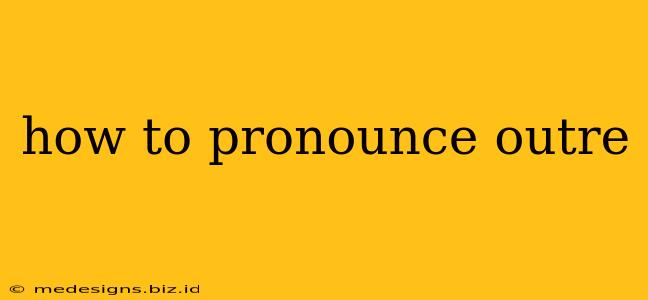The word "outre" is a French word that's crept into English, adding a touch of sophisticated flair. But its pronunciation can be tricky for non-French speakers. Let's break down exactly how to say it.
Mastering the Pronunciation of "Outre"
The key to pronouncing "outre" correctly lies in understanding its French origins. It's not pronounced like "out-ray" or "out-ree". Instead, it sounds more like "oo-truh".
Breaking it Down Phonetically:
- oo: Think of the sound in the English word "moon" or "too". It's a long, rounded vowel sound.
- tr: This is pronounced as a single sound, similar to the "tr" in "tree" or "train," but softer.
- uh: This is a short, unstressed vowel sound, like the "u" in "but" or "sun".
Tips for Perfecting the Pronunciation:
- Listen to Native Speakers: The best way to learn is by listening! Search YouTube or other audio resources for "outre pronunciation" and pay close attention to how native speakers articulate the word.
- Practice Regularly: Like any new word, practice is key. Try saying "outre" aloud repeatedly until it feels natural. Include it in sentences to help with fluency.
- Record Yourself: Recording your pronunciation allows you to identify any areas needing improvement. Comparing your pronunciation to native speakers can highlight subtle differences.
Context is Key:
The word "outre" generally means extravagant, unusual, or outlandish. Understanding its meaning can aid in its proper pronunciation. When you use the word in a sentence, try to emphasize the slightly exotic sound to convey the word's meaning effectively.
Beyond the Basics:
While the pronunciation above is the most common and generally accepted, subtle variations might exist depending on regional accents. However, sticking to the "oo-truh" sound will ensure you're understood in most contexts.
By following these steps, you'll be confidently pronouncing "outre" in no time, impressing your friends and colleagues with your linguistic prowess. So go ahead, give it a try! You'll soon be saying "outre" with the same effortless grace as a native French speaker.
